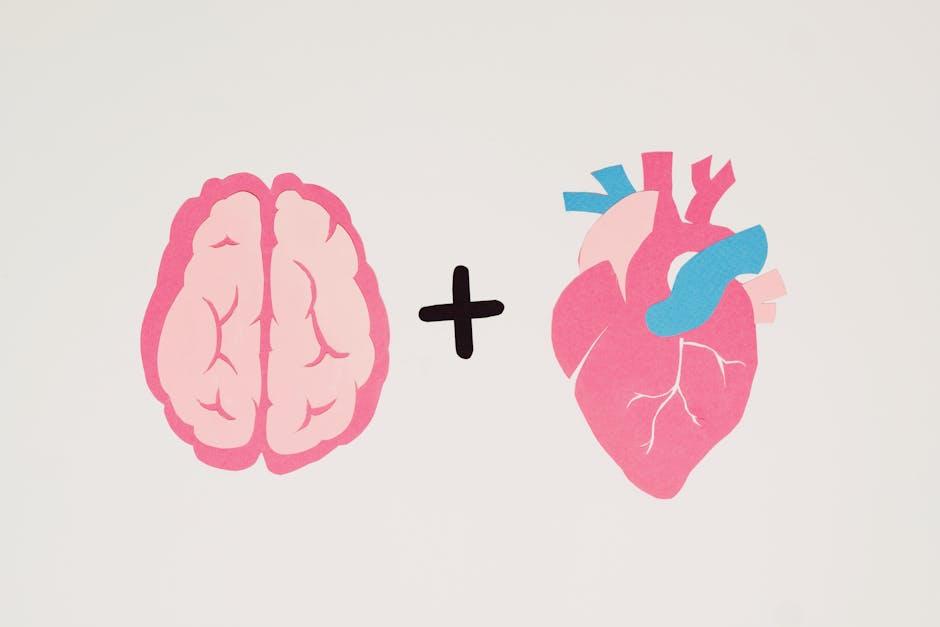Beneath the surface of our bustling minds and complex emotions lies an unexpected influencer: the gut. Often dismissed as merely a digestive organ, the gut is emerging as a powerful player in the intricate dialogue between body and brain. Recent discoveries suggest that the health of our gut may ripple through to our mental wellbeing, shaping moods, thoughts, and even resilience against stress. Exploring this remarkable connection invites us into a fascinating journey through biology and psychology, where understanding the gut-brain axis could unlock new pathways to holistic health.
Table of Contents
- Understanding the Gut-Brain Connection and Its Impact on Mood
- Key Gut Microbes That Influence Mental Health
- Dietary Strategies to Nourish Your Gut and Boost Brain Function
- How Probiotics and Prebiotics Support Emotional Wellbeing
- Lifestyle Habits That Promote a Balanced Gut and Clear Mind
- Q&A
- The Way Forward

Understanding the Gut-Brain Connection and Its Impact on Mood
The intricate dialogue between our gut and brain is a fascinating testament to how interconnected our body’s systems really are. This two-way communication is orchestrated through the vagus nerve, immune system signals, and the production of neurotransmitters by gut bacteria. For instance, a healthy gut microbiome can produce serotonin, known as the “feel-good” neurotransmitter, which significantly influences our mood and emotional well-being. Imbalances or disruptions in this microbiota can send distress signals to the brain, often manifesting as anxiety, depression, or other mood disorders.
Exploring how these connections operate highlights several key factors that affect mental health:
- Dietary habits: Nutrient-rich foods promote a balanced microbiome.
- Stress management: Chronic stress can alter gut flora negatively.
- Sleep quality: Poor sleep disrupts gut and brain function.
| Factor | Impact on Gut | Consequent Brain Effect |
|---|---|---|
| High sugar diet | Feeds harmful bacteria | Increased anxiety |
| Probiotic intake | Balances microbiome | Enhanced mood stability |
| Chronic stress | Inflammation | Depressive symptoms |
Key Gut Microbes That Influence Mental Health
Within our intricate digestive system live microbial communities that do more than just aid digestion—they play pivotal roles in shaping our mental landscape. Lactobacillus and Bifidobacterium species top the list as these beneficial bacteria produce neurotransmitters like gamma-aminobutyric acid (GABA) and serotonin precursors, essential compounds linked to mood regulation and anxiety reduction. Their influence extends beyond the gut lining, communicating with the brain through the vagus nerve, crafting a biochemical dialogue that can sway emotional wellbeing and cognitive function.
Equally significant are microbes like Faecalibacterium prausnitzii and Akkermansia muciniphila, known for their anti-inflammatory properties. Chronic inflammation in the body has been associated with depression and other mood disorders, making these bacteria vital for maintaining a balanced mental state. Below is a snapshot of key gut microbes and their mental health contributions:
| Microbe | Mental Health Role | Key Function |
|---|---|---|
| Lactobacillus | Reduces anxiety | Produces GABA |
| Bifidobacterium | Enhances mood | Serotonin precursor production |
| Faecalibacterium prausnitzii | Anti-inflammatory | Suppresses inflammation |
| Akkermansia muciniphila | Supports cognitive health | Maintains gut barrier |
Dietary Strategies to Nourish Your Gut and Boost Brain Function
Optimizing your diet to support both gut health and cognitive function involves embracing nutrient-dense foods that foster a thriving microbiome while enhancing mental clarity. Incorporating fermented foods like kimchi, yogurt, and sauerkraut introduces beneficial probiotics, which help balance gut bacteria and reduce inflammation—an essential factor linked to improved brain performance. Additionally, prioritizing high-fiber vegetables such as artichokes, asparagus, and leeks feeds these good microbes, creating a symbiotic environment that encourages the production of neurotransmitters like serotonin, often referred to as the “feel-good hormone.”
To better visualize this, consider the table below outlining key dietary elements and their benefits for gut and brain synergy:
| Food Category | Gut Benefit | Brain Support |
|---|---|---|
| Fermented Foods | Increase probiotics | Enhance mood regulation |
| High-Fiber Veggies | Feed gut bacteria | Boost cognitive function |
| Omega-3 Rich Foods | Reduce inflammation | Support memory and focus |
- Hydrate well to aid nutrient absorption and optimize brain signaling.
- Limit processed sugars and saturated fats, which can disrupt both gut flora and cognitive performance.
- Include polyphenol-rich foods like berries and green tea to provide antioxidants that protect neural pathways.
How Probiotics and Prebiotics Support Emotional Wellbeing
Our gut houses trillions of microorganisms, creating a complex ecosystem that can significantly impact our emotional health. Probiotics, the beneficial bacteria found in fermented foods and supplements, work by balancing this microbiome, reducing inflammation, and producing neurochemicals like serotonin, often called the “feel-good” hormone. Meanwhile, prebiotics serve as nourishment for these good bacteria, ensuring their survival and activity. Together, they contribute to a harmonious gut environment that supports a positive mood, reduces anxiety, and enhances stress resilience.
Understanding the gut-brain connection underscores the importance of a diet rich in both probiotics and prebiotics. Here are key effects of their synergy on emotional wellbeing:
- Enhancement of neurotransmitter production linked to mood regulation
- Improved gut barrier function to prevent neuroinflammation
- Reduction of cortisol levels, helping to lower stress
- Support for cognitive functions such as focus and memory
| Component | Role in Emotional Health | Sources |
|---|---|---|
| Probiotics | Promote serotonin & reduce anxiety | Yogurt, kefir, sauerkraut |
| Prebiotics | Fuel good bacteria for sustained balance | Bananas, onions, garlic |
Lifestyle Habits That Promote a Balanced Gut and Clear Mind
Everyday choices profoundly impact the harmony between your digestive system and cognitive clarity. Incorporating fermented foods, such as yogurt, kimchi, and sauerkraut, introduces beneficial probiotics that nurture gut flora diversity, fostering a thriving microbial community. Pair this with a diet rich in fiber—think leafy greens, whole grains, and legumes—that acts as fuel for these friendly bacteria, enhancing digestion and supporting neurotransmitter production. Equally essential is staying hydrated; water flushes toxins and maintains optimal microbial balance, which indirectly boosts mental focus and emotional resilience.
Beyond nutrition, lifestyle rhythms play a pivotal role. Prioritizing quality sleep helps regulate gut-brain communication pathways, while regular physical activity stimulates gut motility and releases mood-enhancing endorphins. Managing stress through mindful practices like meditation or gentle yoga calms the nervous system, preventing harmful chemical surges that disrupt gut integrity. Below is a concise guide to integrating these habits seamlessly:
| Habit | Benefits | Quick Tips |
|---|---|---|
| Fermented Foods | Boosts probiotic diversity | Add a serving daily to meals |
| Fiber Intake | Supports digestion and mental health | Include fruits & veggies in snacks |
| Hydration | Maintains microbial balance | Carry a water bottle everywhere |
| Sleep Quality | Enhances gut-brain signaling | Stick to a consistent bedtime |
| Stress Management | Protects gut lining from damage | Practice daily relaxation exercises |
Q&A
Q: How are gut health and mental wellbeing connected?
A: The gut and brain communicate constantly via what’s known as the gut-brain axis. This bidirectional link means that the state of our gut microbiome—the trillions of bacteria living in our digestive tract—can influence mood, stress responses, and even cognitive function. Essentially, a happy gut often paves the way for a balanced mind.
Q: Can what I eat really affect my mental health?
A: Absolutely. Foods rich in fiber, probiotics (like yogurt and fermented veggies), and polyphenols can nurture beneficial gut bacteria. These microbes produce neurotransmitters such as serotonin and dopamine, which are key players in regulating mood. Conversely, diets high in processed foods and sugars may disrupt gut balance, potentially impacting mental wellbeing negatively.
Q: Is there scientific evidence supporting this gut-mind link?
A: Yes, emerging research highlights that people with mental health conditions such as anxiety and depression often show different gut microbiome profiles compared to healthy individuals. Clinical studies have found that interventions improving gut health—through diet changes or probiotics—can lead to improvements in mood and stress levels, though more research is ongoing.
Q: What lifestyle habits support both gut health and mental wellbeing?
A: Beyond diet, regular exercise, adequate sleep, stress management techniques like meditation, and mindful social connections all contribute positively. These habits promote a balanced microbiome and reduce inflammation, creating fertile ground for mental clarity and emotional resilience.
Q: Should I consider probiotics or supplements for better mental health?
A: While probiotic supplements can support gut diversity, their effects on mental health vary individually. It’s best to consult a healthcare professional before starting any new supplement. Integrating whole foods that naturally support gut bacteria is often a great first step.
Q: How quickly can improving gut health impact my mood?
A: Changes can be gradual. Some people notice subtle mood boosts within weeks of dietary shifts, while for others, it may take months. The gut ecosystem is complex and personal; patience and consistency are key.
Q: What signs might indicate my gut health is affecting my mental state?
A: Common indicators include frequent digestive discomfort, brain fog, mood swings, unexplained anxiety, or low energy. If these symptoms persist, it might be worth exploring gut health as a contributing factor.
Q: Can mental stress harm gut health?
A: Yes, stress triggers the release of cortisol and other hormones that can disrupt the gut lining and alter microbial balance. This can create a feedback loop where gut disturbances then amplify stress and anxiety, making it important to manage psychological stress for overall wellbeing.
Q: Are there specific foods to avoid for better gut and mental health?
A: Minimizing highly processed foods, excess sugars, artificial additives, and excessive alcohol can help maintain gut integrity. These substances may promote inflammation and harmful bacteria growth, potentially worsening mood disorders.
Q: What’s the big takeaway about gut health and mental wellbeing?
A: Our gut and brain are inextricably linked in a dynamic dialogue. Nurturing your gut through mindful eating and healthy habits is an empowering step toward supporting mental clarity, emotional balance, and a happier life. After all, wellbeing truly starts from within.
The Way Forward
In the intricate dance between gut health and mental wellbeing, the tiny organisms within us emerge as silent conductors, subtly influencing moods, thoughts, and resilience. While science continues to unravel this complex symphony, one truth is clear: nurturing our gut is more than a physical act—it’s a holistic investment in our emotional and cognitive harmony. By embracing mindful nutrition, balanced lifestyles, and informed care, we open the door to a healthier mind through a healthier gut. After all, true wellness begins from within, where mind and body converge in quiet, powerful unity.

